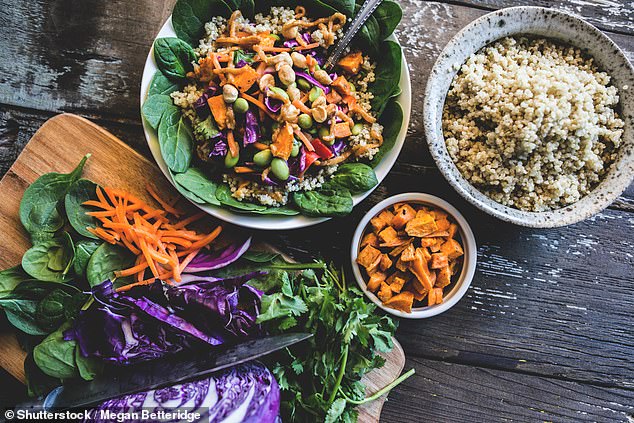People are more likely to opt for unhealthy snacks when listening to songs at a high volume
>
If you’re trying to stick to your New Year diet, a new study advises turning your music down.
Researchers from the University of South Florida found that having low or no music playing in a supermarket or restaurant increases the sales of healthy food, as it induces a state of relaxation.
When louder music is played, however, the purchase of greasy, unhealthy foods increases by 20 per cent.
This is because when music is played at a higher volume, it increases our excitement, stress and arousal levels, according to the study published in the Journal of the Academy of Marketing Sciences.

If you are trying to stick to your New Year’s diet and reach for healthier snacks, you should try and turn your music down. A study from the University of South Florida found having low or no music in supermarkets or restaurants increases the sales of healthy foods
The study carried out research in a café in Stockholm, dividing snacks into healthy, neutral and unhealthy categories.
Researchers then played music at a higher or lower volume.
It found that when music was played at 70 decibels (db), 52 per cent of the items bought were unhealthy, compared with 25 per cent of healthy items bought.
When music was playing at 55db, however, the amount of healthy items bought increased to 32 per cent, whereas purchases of unhealthy items decreased to 42 per cent.
This New Year, 43 per cent of Brits taking on New Year’s resolutions said they wanted to eat healthier.
As January gets underway, Oxford Professor of Experimental Psychology, Charles Spence advised people to turn down the volume on their speakers or headphones if they want to fulfil their healthy eating aim.
He explained: ‘We often blame our own willpower when it comes to ditching New Year’s resolutions sooner than we hoped, but the science shows there is much more at play.
‘The findings show that music could be the reason you’re finding it hard to make healthy snacking choices.’
If we are playing our favourite music from our favourite playlist at a high volume, we are most likely to snack.
Professor Spence added: ‘High volume music enhances excitement levels, which research has shown leads to unhealthy food choices.
‘The key to reaching for a Pink Lady apple instead of pick and mix is to listen to your favourite songs on a low volume, as research has proven that this makes us more likely to opt for healthy foods due to induced relaxation.
‘Research reveals that low volume music is better for healthy food choices than listening to no music at all, so don’t ditch the playlist altogether.’
In 2017, a café in Beijing put the theory to the test, playing sweet, soft music in an attempt to reduce sugar contents in their drinks while keeping the sweetness the same.
Similarly, another study looking into how we can improve smell and taste, found that playing sounds of an apple orchard can improve the test, smell and feel of an apple.


A YouGov poll takin in the last weeks of 2022 found that of those Britons undertaking resolutions, a total of 43 per cent wanted to improve their diet
A YouGov poll taken in the last weeks of 2022 found that 21 per cent of Britons planned to make a New Year’s resolution, with improved fitness and healthy eating being the most popular goal.
A total of 53 per cent of men and women across the country wanted to improve their exercise routine, while a further 43 per cent wanted to improve their diet.
After healthy eating and improved fitness, more than a third of people wanted to save more money in 2023, as the cost-of-living crisis bites.
Lynn Shaw from Pink Lady, which commissioned the research, said: ‘With healthy eating and fitness at the top of Brits’ most-made resolutions on January 1, many of us will be looking for ways to make it easier along the way.
‘That’s why we’ve teamed up with Charles to help decode the science of gastrophysics and provide Brits with a list of weird and wonderful hacks that are backed up by science to help them keep their resolutions this year.’
This is not the first time music eating habits have been linked.
A similar study undertaken in 2021 found that the music you listen to at meal time can also affect the type of food you eat.
Researchers at the Aarhus University in Denmark, divided volunteers into two groups, one listening to a fast, less harmonious composition played in minor key, known to trigger emotions like sadness or suspense.
The other group was played sad music.


In 2013 a study conducted by the University of Birmingham, found that eating in front of a TV will lead to us eating more food at that meal and during out next meal
The report, published in the journal appetite, found that those listening to slow-music were more likely to pick healthier foods.
This is attributed to the fact people would be more distracted by fast-pace, erratic music and even affected by negative emotions, therefore, giving less consideration to what they choose to eat.
Similarly, in 2013 a study conducted by the University of Birmingham, found that eating in front of a TV will lead to us eating more food at that meal and during out next meal.
This is because we are distracted by noise and visual stimuli – this means when we go to recall our last meal, we do not remember it as well, or how much we have eaten.
If you enjoyed this article …
Why eating in silence can make you healthier: New study suggests noise can affect your choice between healthy meals and junk food
Music could be the secret to eating less: Playing slow tunes during meals discourages people from wolfing down their food, study shows
Feeling stressed? Reach for the stereo, not the snacks! Experts say listening to music by the likes of Amy Winehouse and Eminem can stop you comfort eating

